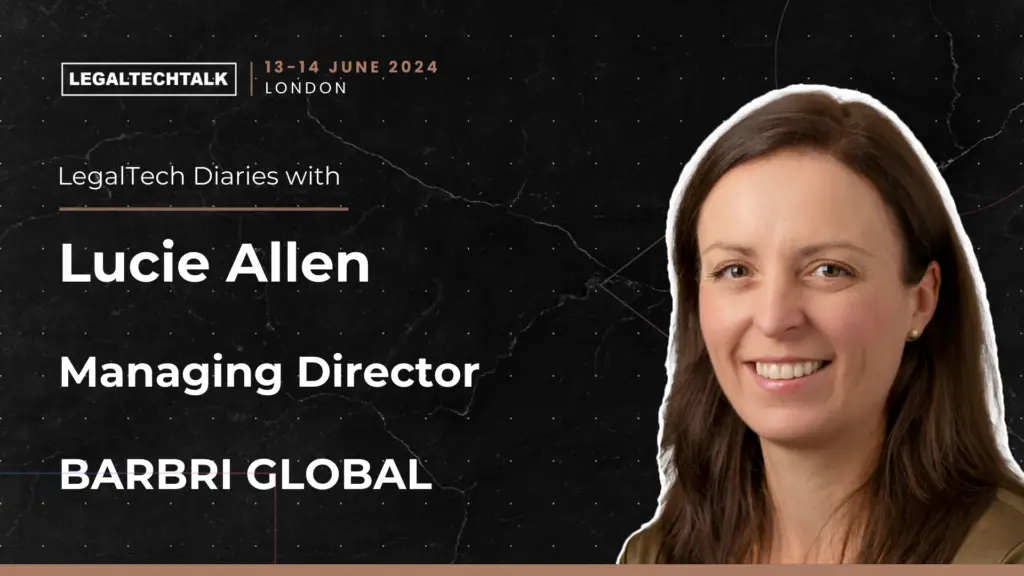In this interview, Lucie Allen, Managing Director at BARBRI Global, discusses the changes in legal education and qualifications in England and Wales, the transition from the Legal Practice Course to the new Solicitors Qualifying Exam (SQE). She highlights the opportunities this presents for law firms and individuals, including increased flexibility in preparation courses, the ability to structure qualifying work experience across multiple placements, and the potential to attract and retain a more diverse pool of talent.
Lucie emphasises that while the SQE alone won’t solve diversity issues, it provides data to address attainment gaps. She stresses the importance of technology, skill advancement, and innovative training programs tailored to younger generations’ preferences.
Bradley Collins: Hi Lucie, I’d love to get your view on the changes you’re seeing in legal industry education and qualifications?
Lucie Allen: The legal industry is going through considerable change from technology to diversity to billable hours. One area of rapid transformation is the route to qualification for solicitors in England and Wales. We are currently in a transition phase as the old Legal Practice Course (LPC) phases out and the new Solicitors Qualifying Exam (SQE) phases in. Those now looking to pursue a career as a solicitor face a centralized assessment testing practical legal knowledge, competence and skills supported by a period of work experience replacing the traditional training contract. These changes in part are helping shape the future by increasing access, opportunity, and diversity in the profession.
Bradley Collins: What are the opportunities that exist for law firm leaders as a result? It would be great to hear your thoughts on the art of the possible.
Lucie Allen: The changes bring opportunity across the industry, for employers and individuals alike. The preparation course market has exploded and with it an increased amount of flexibility. Barbri have been successfully preparing students to pass the bar exam in the US for over 50 years. We have built on our expertise, technology, pedagogy, and quality to create and deliver courses for those looking to become solicitors in England and Wales.
Excitingly and encouragingly, our students are reporting pass marks significantly higher than the average, demonstrating a growing confidence in our approach. Employers and individuals can curate their period of learning, weaving in other priorities or demands. The Barbri personal study plan (PSP) platform provides the learner with a personalised journey, supported and underpinned by a learning coach ensuring they feel confident and prepared ahead of exam day.
“The SQE won’t solve the diversity problem on its own but the new process is providing an increased availability of data that the industry can use to better address key issues such as attainment gaps, which is clearly evident”
The period of qualifying work experience can be achieved across up to four different placements over a of two years. This creates space for in-house teams, general counsel, law firms beyond big law or city law to think about how they might structure programmes to support both the business and the individual. Collaborations between private practice and general counsel can create valuable secondment programmes during this time, giving the individual experience that will increase their value and contribution to the business. Equally, pro-bono work experience, law clinics and experiences that enable the individual to demonstrate and build on the required SRA competencies whilst delivering legal services all count.
Bradley Collins: Finally, please share some of your views on how law firms and corporations alike can better attract and retain top talent and improve diversity?
Lucie Allen: Conversations are well underway around how this shift can support talent attraction, retention and development. The legal industry can be quite traditional and has previously drawn on individuals from top-tier universities to be part of private-practice-exclusive training contract cohorts. The SQE is helping highlight alternative routes to qualification which in turn unlock a breadth of talent and diversity. Solicitor apprenticeships are a great example of this, supporting social mobility and enabling those learners to earn whilst they qualify. They are also a great way for employers who have not previously taken on trainees to plan and enable training through the apprenticeship levy.
It’s important to note that the SQE won’t solve the diversity problem on its own but the new process is providing an increased availability of data that the industry can use to better address key issues such as attainment gaps, which is clearly evident. The SRA’s Law Firm Diversity data 2021 highlighted a promising rise of women, disabled lawyers, and individuals from Asian backgrounds entering the legal profession. However, the statistics showed discrepancies in the lack of lawyers from BME groups and the seniority gap between genders.
There is a clear business case that diversity attracts talent, and supports performance, advantage, reputation, and achievement for employers. The industry continues to respond and adapt to accommodate through training, education, hiring practice, policy reviews, and intentional goal setting.
More widely, the use of technology, the ability to use technology, and recognizing the potential impact on business models will continue to be critical and appealing to junior talent. Focus on skill advancement and supporting talent to develop within the business will have a positive effect on loyalty for employers. Younger generations’ preference for flexible, online, engaging learning with proven outcomes is on the rise, and building the SQE into innovative training programs can play a key part in talent strategy and workforce planning.
Read all 13 interviews with legal experts in our latest LegalTech Diaries Volume 3: https://www.legaltech-talk.com/legaltechdiaries/volume-3/
Lucie will also be speaking at LegalTechTalk 2024 on 13-14th June 2024 at InterContinental O2 in London where over 2,500 in-house and law firm leaders, legaltech startups, and investors will join us for 2 full days of insights and networking. See more here: https://www.legaltech-talk.com/








